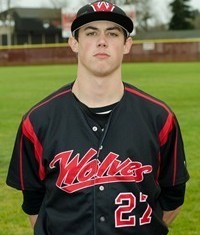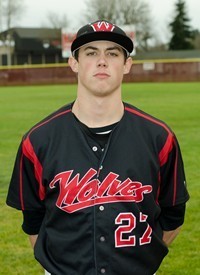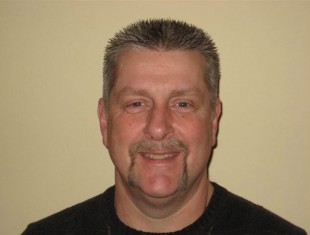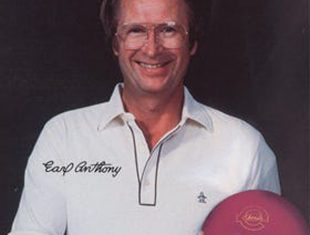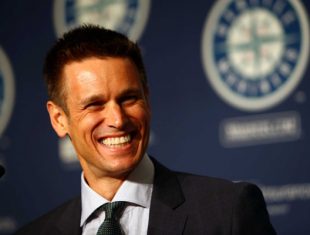Spenser Watkins
By Terry Mosher
Editor, Sports Paper
It is the ambition of almost every player who puts on a baseball uniform to someday get paid for play.
Spenser Watkins is no different. His parents moved so he could play at a prestigious baseball high school, he spent two years at a community college and last year at Western Oregon University, which has a highly thought of baseball program, and this summer for the first time since high school he’s playing ball.
All of his baseball playing serves two purposes that intersect. One, its so he can get better and two so he can get noticed by pro scouts and get drafted, perhaps even by his favorite team, the Chicago White Sox.
It would help his cause, sure, if something positive and extraordinary would happen. But you can’t rely on minor miracles.
Or can you?
Watkins sure can try. He went out Friday (July 26) at the baseball park at the Kitsap Fairgrounds and did what every little boy with a glove and ball and a dream fantasizes about.
The six-foot-one, 185-pound right-hander tossed not just a no-no. That would be incredible enough. But a perfect game – the first in West Coast League history ‑to lead the Kitsap BlueJackets to a 2-0 victory over visiting Victoria.
Imagine that? A perfect game in which no Victoria HarborCats’ player reached base. Watkins struck out 10 and got his first win for the BlueJackets, and you can imagine pro scouts are now scrambling to catch the next ferry to Bremerton to see what is going on.
They’ll have to wait. Watkins isn’t scheduled to pitch again on this homestand. They may have to rent a car and drive to Klamath Falls in Oregon to see him pitch again.
It is weird how some things work. Watkins said he didn’t warm up very well in the bullpen before taking the mound Friday. But once he got on the mound he was perfect.
Before Friday’s game, BlueJackets’ manager Ryan Parker said of all his pitchers Watkins had the best pro potential. There is little question about that now.
“He’s got a good fastball (high 80s, low 90s), locates his off-speed down in the zone,” said Parker. “He was an all-star (West Coast League) for us this year. He’ll be at senior next year (Western Oregon) and I think he’ll get a shot to play pro ball. He’s got the stuff.”
Parker got Watkins by calling Western Oregon and asking if the coach had a couple arms. Watkins and Gary Steindorf, another right-hander, were sent. Steindorf was sent back after developing arm problem.
The Bend Elks of the WCL were also interested in Watkins, so Parker is very pleased he is with the BlueJackets.
Actually, Watkins, who threw a perfect inning in The WCL All-Star game on July 23, has been battling a sore back. Parker had been giving him some time off here and there. Watkins said it felt good prior to his perfect game.
Watkins, the youngest of four sons, was living with the family in the Tempe, Az., when they moved to Paradise Valley (north Phoenix near Scottsdale) so he could attend Horizon High School.
“My parents learned about Horizon and really wanted me to go to a good baseball school, so they moved out to that area,” says Watkins. “I was just two minutes away from Horizon.”
Two of Watkins older brothers were also good baseball player. Tanner Watkins was a pitcher who was drafted by the Marlins. His career ended when he blew out a shoulder in his first year after playing at South Mountain Community College in Arizona.
Watkins went to Glendale Community College out of high school. One of the coaches at Western Oregon had played at Glendale, and that is how Watkins made it to Monmouth, Oregon.
What is strange about the success Watkins is starting to enjoy is he didn’t start pitching until his senior year at Horizon. He was a catcher and outfielder, but had trouble connecting at the plate.
He had a good arm, so the coaching staff, led by the highly honored Eric Kibler (three time Arizona coach of the year, three time regional coach of the year, and in 2005 was named the American Baseball Coaches Association national coach of the year), decided to try him as a pitcher.
Good move.
It was Kibler, who will be in his 32nd year as the Horizon Huskies head baseball coach (his teams have won five Arizona 5A state championships and in 2007 his team was the No. 1 team in the country) and is also the pitching coach who made the final decision on Watkins.
And Watkins has nothing but good to say about him.
“He told me there was only so much he could do with me to just get me to the next level and have another pitching coach develop me,” says Watkins. “So he got me to a point where I could get to another school and advance my talents there.
“I appreciate everything he did for me. That was awesome,” says Watkins.
By the time Watkins got to Western Oregon he had become a pretty defined pitcher, considering he had gotten such a late start. This past college season he went 8-4 with a 3.19 ERA, second best among starters, and struck out 88 in 84.2 innings, which is a good ratio and usually an indication of a power pitcher.
He was named the Newcomer of the Year for the Great Northwest Athletic Conference and was one vote away from being named conference pitcher of the year.
“They gave it to one of our seniors,” says Watkins. “I had a 1.75 ERA in conference. So it was a really good year for me.”
He failed to mention he was named the National College Baseball Writers Association West Region (NCAA D-2) Pitcher of the Week (also shared the conference player of the week) after he blanked Northwest Nazarene 6-0 on five hits while striking out a GNAC season high 12 batters.
“The pitching coach (at Western Oregon), Mike McInerney, is awesome,” Watkins says. “He just tweaked little things here and there that made all the difference in the world for me. Like, learning how to use my legs. Cause I was all arms, and he taught me how to use my hips. It added two to three miles and hour on my fastball and helped me with my control and helped me be a better pitcher all-around.”
The ceiling right now on his fastball is 93 and he usually throws between 89-91. He throws the fastball, curve, changeup and slider. His out pitch is the slider.
“I have a good curveball, but I’m still developing it,” he says. “But my slider has been my bread and butter.”
Watkins’ plan is to play for pay. He has filled out a player profile for the Cleveland Indians, has talked to the Minnesota Twins and the Chicago Cubs and has been told the Houston Astros are interested.
“I’m going to keep on doing what I’m doing, and hopefully it will take me far,” Watkins said.
If he continues to throw perfect games he will get far in a hurry. We all know that is improbable, but being perfect once might be good enough to put him over the hump with those teams already interested and kick-start some others to get interested.
If baseball doesn’t work out Watkins plans on doing something in the psychology field. He was going to be an engineer, but took psychology 101 his first year at Glendale and fell in love with it.
Studying psychology has helped him as a pitcher in several ways, the mental approach to pitching a game and learning how to cope on the mound if his defensive support fails him or for some reason his pitches don’t fool batters on a given day.
“Rather than dwelling (on mistakes) I know I can get a ground ball and everything will be okay rather than dwelling on it,” he says. “So, yeah, my schooling definitely helps my pitching.”
And a perfect game certainly gives him a boost, not just in confidence, but in good standing among pro scouts.

